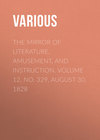Читать книгу: «The Mirror of Literature, Amusement, and Instruction. Volume 12, No. 329, August 30, 1828», страница 2
STANZAS TO, AND IN ILLUSTRATION OF, A LANDSCAPE BY CLAUDE
(For the Mirror.)
Young land of beauty, and divine repose!
Art thou a dream? a vision from on high
Unveiling Paradise? uncurt'ning those
Supernal glories, Eden doth supply
To glad immortals? o'er thee, ev'ning glows,
Brilliant, as seraph's blush—pure as his breath—
Smiling an antidote to tears and death!
Young land of beauty! (fancy could not dwell
In lovelier, albeit her rainbow wings
Fold, but in fairy-spheres) a living well
Of sylvan joy art thou, whose thousand springs
Gush, sinless, gladness, peace ineffable,
And that luxuriousness of being, which
Mocks eloquence: warm, holy, ruby, rich.
Young land of beauty! 'neath thy sun-ting'd shades,
Beside thy lake, crystal in roseate light,
Enam'ring music breathes: there, raptur'd maids
In dances, with adoring youths unite;
There, magic voices sigh in song; and glades
With birds and blossoms, all but vital, seem
Entranc'd, like hermit in divinest dream!
Young land of beauty! art thou but a ray
Of intellect, emerg'd from one? and shrin'd,
That thine immortal light may dim the day,
Faint struggling thro' some lowlier, cloudier, mind:
Dream of the painter-poet! oh! we'll say,
Lur'd to ethereal musings by thy thrall,
Tho' dream in part, no dream art thou in all!
M.L.B
MARCH OF "IMPROVEMENT."
(For the Mirror.)
An old Subscriber has sent us the following questions on the improvement of the metropolis, which we insert as a castle-building jeu d'esprit rather than as a serious matter. They will, however, serve for the committee of taste to crack after dinner, and give a zest for their magna bona.
Ought not the new palace to have been built in the richest Gothic style, so as to have deviated in appearance from every other edifice in the metropolis; and to have been erected on the north bank of the Serpentine?—And, if the dome of the present erection is not to be removed, cannot it be ornamented?—Or could not the pediment, fronting the park, be raised another story, so as to hide it (the dome) from that side?—Indeed, would not the palace be much improved by such an alteration? I think if it be left as it is, when the wings are raised to the height of the body of the palace, (though they are a wonderful improvement upon those first erected) the whole will have a very flat appearance.—Are not the statues of Neptune, &c., much too small, and the other ornaments, consisting of representations of warlike implements, &c., much too heavy to look well?
Is not the Borough a very improper place for the king's, or any other, college?—Is it not the very mart of trade, and consequently ever noisy and in confusion?—And what a magnificent improvement would its erection near Westminster Abbey be to that ancient and very sumptuous pile. Could it not be erected from Tothill Street, and extend towards Storey's Gate?—And should it not be built in the Gothic style to correspond with the abbey? The seat of learning and wisdom is in that neighbourhood (Westminster School, Houses of Parliament, Courts of Justice, &c.); therefore it is the place best adapted for the erection of a college. Ought not also those disgraceful erections close to the abbey's western front, to be instantly removed?—And ought not the house of the dean, &c. to be also rebuilt in the Gothic style, and extend from Tothill Street towards St. John's church? I never see this abbey (the glory of London) without feeling utterly disgusted at the surrounding objects. The great tower, also, should be erected in the same style as the other two. But should not the council office, and Somerset House, be finished before other works are begun?—Should not the interior of the dome of St. Paul's be repainted and gilt, and the windows (particularly the three over the altar) be of stained glass?—And should not the railing on the top of the dome on the outside (which is much decayed) be replaced by railing made of the new metal lately invented, which imitates brass, and does not tarnish?—Would not the entrance for the public, from Piccadilly into St. James's Park, be much better two or three yards from the new royal archway, as it will be very likely to be injured by people passing so near it?
Would not a Swiss cottage and a Chinese temple very materially improve the appearance of the islands in St. James's Park; and two or three vessels upon that water, and the Serpentine in Hyde Park, also add very much to the effect?—Would a tower, surrounded by a railing, as the monument, and surmounted by a statue of George III. (looking with surprise to see what his son had done), or Canning, or Byron, be a proper sort of monument as a tribute to their memories; and to be erected in the centre of the Regent's Park? Oh! what a prospect would its summit command! Would not magnificent baths for males and females, erected on either side of Waterloo Place, and to be supplied from the new fountain, be a great addition to the beauty and comfort of this great city.
These additions, alterations, and improvements, ought to be made now; and I doubt not, in the course of time, all warehouses will be removed from the banks of the Thames, above Blackfriars' Bridge, and that streets will run by the waterside as at Dublin. Also the time will come when the houses round St. Paul's will be pulled down and rebuilt in the Grecian style of architecture to correspond with the cathedral (the wonder of England), and be re-erected at a much greater distance from it.
I would also ask, "should not the chimney pots upon the palaces in Regent Street, &c. be of a slate colour?—Should not all tiles be painted of the same colour? (slate.)—Should not the names of streets be more particularly attended to?"
INTRODUCTION OF SILK INTO EUROPE
(For the Mirror.)
The frequency of open hostilities between the Emperor of Constantinople and the monarchs of Persia, together with the increasing rivalry of their subjects in the trade with India, gave rise to an event which produced a considerable change in the silk trade. As the use of that article, both in dress and furniture, became more general in the court of the Greek emperors, who imitated and surpassed the sovereigns of Asia in splendour and magnificence; and as China, in which, according to the concurring testimony of oriental writers, the culture of silk was originally known, (Herlelot. Biblioth. Orient.), still continued to be the only country which produced that valuable commodity; the Persians improving the advantages which their situation gave them over the merchants from the Arabian Gulf, supplanted them in all the marts of India, to which silk was brought by sea from the east. Having it likewise in their power to molest or to cut off the caravans, which, in order to procure a supply for the Greek empire, travelled by land to China through the northern provinces of their kingdom, they entirely engrossed that branch of commerce. Constantinople was obliged to depend on the rival power for an article which luxury reserved and desired as essential to elegance. The Persians, with the usual rapacity of monopolists, raised the price of silk to such an exorbitant height, that the Emperor Justinian eager, not only to obtain a full and certain supply of a commodity which was become of indispensible use, but solicitous to deliver the commerce of his subjects from the exactions of his enemies, endeavoured, by means of his ally, the christian monarch of Abyssinia, to wrest some portion of the silk trade from the Persians. In this attempt he failed; but when he least expected it, he, by an unforeseen event, attained in some measure (A.D. 55.) the object which he had in view. Two Persian monks having been employed as missionaries to some christian churches which were established (as we are informed by Cosmas) in different parts of India, had penetrated into the country of the Seres, or China. There they observed the labours of the silk-worm, and became acquainted with all the arts of men in working up its productions into such a variety of elegant fabrics. The prospect of gain, or perhaps an indignant zeal excited by seeing this lucrative branch of commerce engrossed by unbelieving nations, prompted them to repair to Constantinople. There they explained to the emperor the origin of silk, as well as the various modes of preparing and manufacturing it—mysteries hitherto unknown, or very imperfectly understood in Europe, and encouraged by his liberal promises, they undertook to bring to the capital a sufficient number of those wonderful insects to whose labours man is so much indebted. This they accomplished by conveying the eggs of the silk-worm in a hollow cane. They were hatched by the heat of a dunghill; fed with the leaves of a wild mulberry-tree, and they multiplied and worked in the same manner as in those climates where they first became objects of human attention and care. Vast numbers of these insects were soon reared in different parts of Greece, particularly in the Peloponnesus. Sicily afterwards undertook to breed silk-worms with equal success, and was imitated from time to time in several towns of Italy. In all these places extensive manufactures were established and carried on with silk of domestic production. The demand for silk from the East diminished, of course. The subjects of the Greek emperors were no longer obliged to have recourse to their enemies, the Persians, for a supply of it; and a considerable change took place in the nature of the commercial intercourse between Europe and India.
Before the introduction of the silk-worm into Europe, and as often as its production is mentioned by the Greek and Roman authors, they had not, for several centuries after the use of it became common, any certain knowledge either of the countries to which they were indebted for this favourite article of elegance, or the manner in which it was produced, By some, silk was supposed to be a fine down adhering to the leaves of trees or flowers; others imagined it to be a delicate species of wool or cotton; and even those who had learned that it was the work of an insect, show by their description that they had no distinct idea of the manner in which it was formed. A circumstance concerning the traffic of silk among the Romans merits observation. Contrary to what usually takes place in the operations of trade, the more general use of that commodity seems not to have increased the quantity imported in such proportion as to answer the growing demand for it; and the price of silk was not reduced during the course of 250 years from the time of its being first known in Rome. In the reign of Aurelian it still continued to be valued at its weight in gold. (See Robertson's History of India.)
It is a singular circumstance in the history of silk, that, on account of its being an exertion of a worm, the Mahomedans consider it as an unclean dress, and it has been decided with the unanimous assent of all their doctors, that a person wearing a garment made entirely of silk cannot lawfully offer up the daily prayers enjoined by the Koran. (Herbel. Bibl. Orient.) C.V.





















